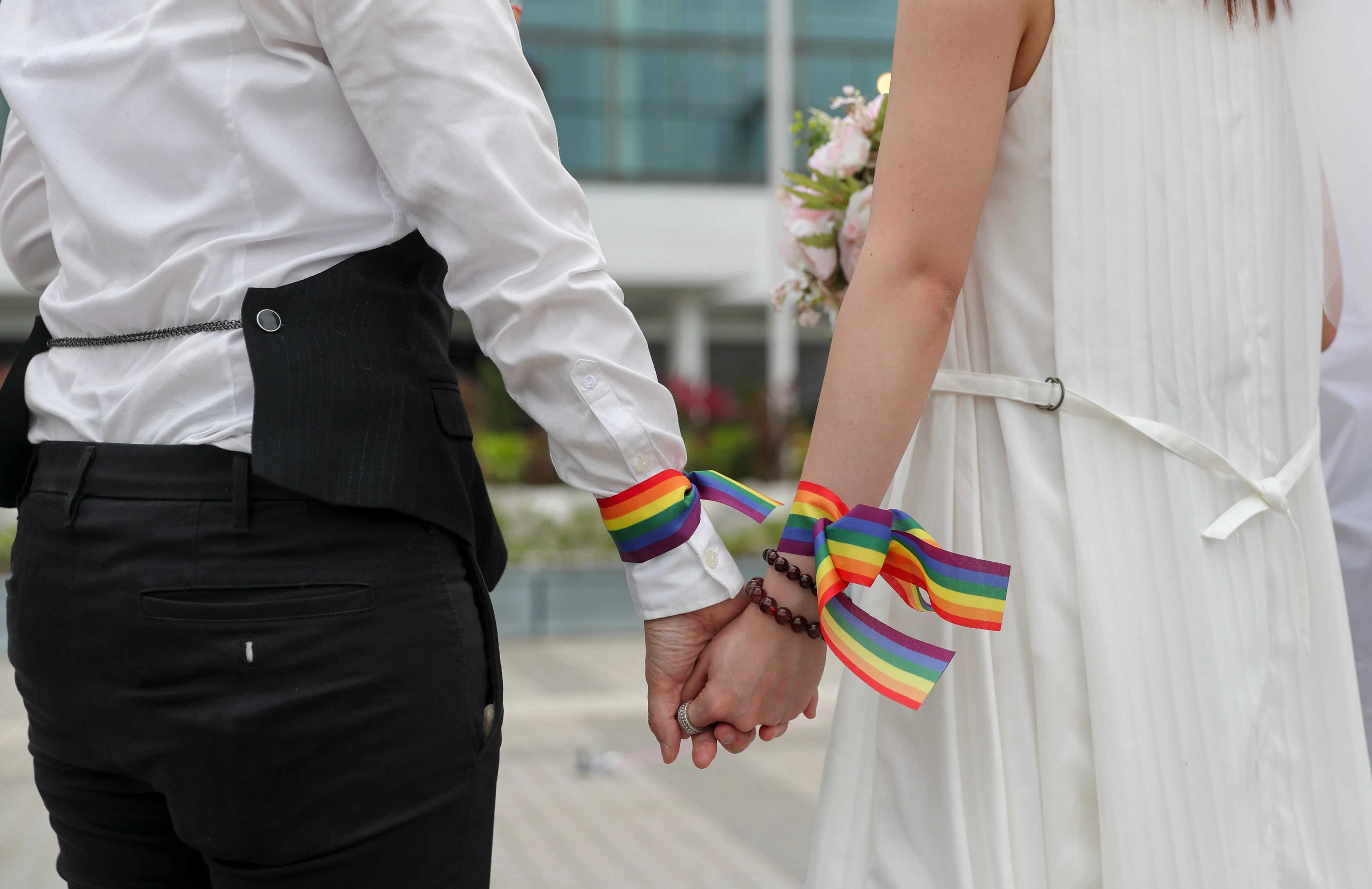By Jeffie Lam Natalie Wong Willa Wu
A proposal by the Hong Kong government to recognise same-sex partnerships in line with a top court ruling may hit a dead end amid mounting opposition in the legislature, with one legal expert saying authorities may consider a rejection as closing the file on the controversy.
Failure to enact the legislation could mean that same-sex couples would continue to be barred from having their relationships officially recognised in the near future and invite more judicial challenges, lawyers warned on Friday.
The Court of Final Appeal found the government was violating the Bills of Rights when it ruled in favour of a judicial challenge by activist Jimmy Sham Tsz-kit in 2023. It gave the government two years to draw up laws setting out “core rights” of same-sex couples, but did not outline what they might be.
On Friday, lawmaker Regina Ip Lau Suk-yee, the convenor of the key decision-making Executive Council, said she and five other members of her New People’s Party would vote in favour of the “very practical and basic” proposal by the government, a day after several major political parties voiced opposition to the plan in the Legislative Council.
In a paper submitted to Legco on Wednesday, the Constitutional and Mainland Affairs Bureau proposed allowing same-sex couples to apply to have their relationship recognised in Hong Kong if they had first registered it in another jurisdiction.
The move would grant same-sex couples some rights, such as those related to medical and after-death matters, although some LGBTQ activists described the proposal as conservative and vague.
“The government actually has only done the minimum through the proposal in fulfilling what the court has ordered,” Ip said, noting the plan did not cover any rights that might be deemed controversial, such as adoption.
She called on the government to step up efforts to lobby individual lawmakers in the face of strong party opposition.
So far, at least 41 legislators of the 89-member legislature – including those from the Democratic Alliance for the Betterment and Progress of Hong Kong, the Business and Professionals Alliance, the Federation of Trade Unions and the Liberal Party – have indicated their objection to the proposal.
A government bill requires a majority vote of members present to be passed.
A source said officials were “well aware” of political parties’ reservations and had “prepared” to apply to the court to extend the deadline for compliance, which falls on October 5.
“Officials don’t mind if it gets vetoed. After the summer recess in August ends, there won’t be sufficient time to introduce a revised version in this Legco term,” the insider said. “The government will then tell the court that its part is done and it must leave the matter to the next Legco term.”
The court ruled the government had a constitutional duty under Article 14 of the Bill of Rights to provide an alternative legal framework for same-sex couples.
“The court should accord a wide margin of discretion to the government and the legislature in these regards,” the judgment stated, adding that any “inaction” by the legislature would violate the Bills of Rights.
A lawmaker, who wished to remain anonymous, said vetoing the bill and expressing concerns over it should be considered “active actions” in legislators discharging their duties.
Senior Counsel Ronny Tong Ka-wah, also an Exco member, said the government could regard the matter as “a closed file” if the legislature eventually voted against the proposed legal framework.
“The red light from the legislature does not mean the executive has not done its job to respect the court order, while the judiciary cannot order the legislature to make any legislation,” he said.
But there was still time and room for the government to adjust the proposal, he said.
“At the end of the day, the same-sex issue is a social and cultural issue rather than a legal one,” he said. “Public opinion should also be taken care of.”
In 2013, the top court ruled in another landmark case that a transgender woman, identified as W, could marry her boyfriend as it was unconstitutional to bar her from doing so.
But the amendments to the marriage law put forward by the government were vetoed by the legislature the following year.
At the time, the pro-establishment bloc said the concept of marriage should not be “extended boundlessly”, while the pan-democrats objected to the bill’s requirement that a person must undergo full gender reassignment surgery to be considered transgender.
The government has not put forward an amendment to the law since.
Human rights lawyer Mark Daly argued that the government still had a positive obligation to establish a mechanism for recognising same-sex partnerships even if the proposal was voted down.
He also called on the government to conduct a public consultation, saying the present proposal was “discriminatory and lacking in many aspects”, which might “invite much more litigation, all to the detriment of those seeking their legitimate rights and to Hong Kong’s international reputation”.
Barrister Azan Marwah said he expected that further judicial reviews would be initiated if the government failed to propose and pass legislation that complied with the court ruling.
Constitutional law expert Albert Chen Hung-yee, of the University of Hong Kong’s law school, stressed that time remained for lawmakers to consider the matter in greater detail.
“It is merely a proposal to enable same-sex unions that have been entered into overseas, under the laws of other countries, to be recognised in Hong Kong, but only for the very limited purposes of medical-related matters in cases of life-threatening illness and with respect to after-death arrangements for deceased same-sex partners,” he said.
“I think the legislature can be persuaded to accept the proposal on humanitarian grounds.”
